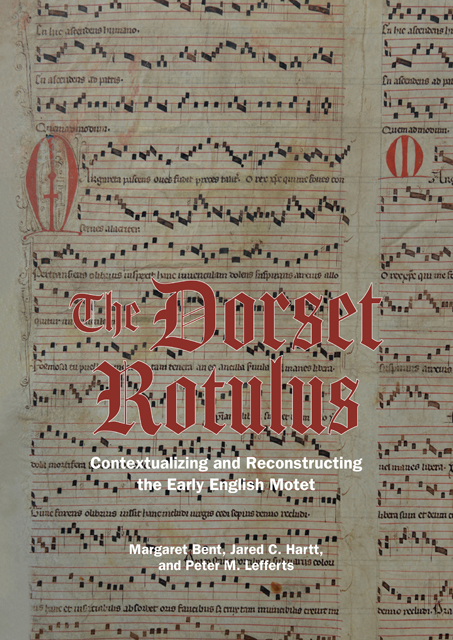Book contents
- Frontmatter
- Contents
- List of Figures
- List of Music Examples
- List of Tables
- Abbreviations
- Note on the Transcriptions
- Introduction
- 1 The Source and its Contents
- 2 Contexts and Designs
- 3 Voice-Exchange Motets and Ascendenti sonet geminacio/ Viri Galilei
- 4 Margareta pascens oves and its Large-Scale Comparands
- 5 Rota versatilis: Towards a Reconstruction
- 6 The Curious Case of Regina preminencie/ Gemma nitens/ … mater es intacta
- 7 Introducing Naufragantes visita/ Navigatrix inclita/ T. Aptatur/ … velox perpetrat
- 8 The Musical Rotulus: Artifact, Image, and Attributes
- 9 Epilogue: Conclusions and Speculation
- Appendix: Transcriptions, Texts, and Translations of the Four Dorset Motets
- Bibliography
- Index of Manuscripts
- Index of Musical Compositions
- General Index
- Studies in Medieval and Renaissance Music
9 - Epilogue: Conclusions and Speculation
Published online by Cambridge University Press: 14 January 2023
- Frontmatter
- Contents
- List of Figures
- List of Music Examples
- List of Tables
- Abbreviations
- Note on the Transcriptions
- Introduction
- 1 The Source and its Contents
- 2 Contexts and Designs
- 3 Voice-Exchange Motets and Ascendenti sonet geminacio/ Viri Galilei
- 4 Margareta pascens oves and its Large-Scale Comparands
- 5 Rota versatilis: Towards a Reconstruction
- 6 The Curious Case of Regina preminencie/ Gemma nitens/ … mater es intacta
- 7 Introducing Naufragantes visita/ Navigatrix inclita/ T. Aptatur/ … velox perpetrat
- 8 The Musical Rotulus: Artifact, Image, and Attributes
- 9 Epilogue: Conclusions and Speculation
- Appendix: Transcriptions, Texts, and Translations of the Four Dorset Motets
- Bibliography
- Index of Manuscripts
- Index of Musical Compositions
- General Index
- Studies in Medieval and Renaissance Music
Summary
Motets in the decades around 1300 have long been the focus of abundant, thoughtful scholarship, but most of this work has concentrated on motets on the continental mainland. Although a modest number of individual studies on English motets during this period have appeared in recent decades – these are referenced in this book – it has been over thirty-five years since a monograph was dedicated to the genre in England. The discovery of the Dorset rotulus with its four magnificent compositions has prompted another extended discussion. Motet composition c. 1280–1320, on both sides of the channel, was moving in multiple directions, from multiple starting points. The known Latin-texted English motets – impressive in number whether complete or fragmentary, or simply listed in a manuscript’s table of contents – themselves attest numerous approaches. And indeed, as the preceding chapters have demonstrated, composers of motets in England explored the potential of the genre with musicality and ingenuity.
Two of the four Dor compositions, Ascendenti/Viri and Margareta, are voice-exchange motets, as is Rota versatilis, a strong candidate for original inclusion on the rotulus; this type of motet was the focus of Chapters 3, 4, and 5 in this volume. Through reconstruction, detailed analyses, and a close examination of many comparands, we have seen how composers in England used the voice-exchange framework as an opportunity for creative variation on this approach to design. Innovative, individualistic approaches to familiar archetypes are not confined to voice-exchange motets but are manifest in the many types of motet cultivated in England, notably here in the two unconventional motets on the dorse of Dor, the three-voice Regina/Gemma and the heretofore unknown four-voice Naufragantes/Navigatrix. On the whole, we have seen how the four Dor motets and their comparands exemplify different approaches to overall design, repetition, refrain, variation, voice exchange, number of texted voices, declamation, strophism, voice function, voice leading, and sonority.
The attention here granted to these motets has highlighted several remarkable features of the English motet repertory and the manner in which it is preserved. The lower voices of Ascendenti /Viri in Dor are laid out by the scribe in a way that clearly illustrates its six-section structure; and this motet, with its single poetic text, becomes bitextual in performance. We also observed how Naufragantes/Navigatrix features an unusual system of chained text exchange with intermittent poetic texting in its lower voices.
- Type
- Chapter
- Information
- The Dorset RotulusContextualizing and Reconstructing the Early English Motet, pp. 335 - 338Publisher: Boydell & BrewerPrint publication year: 2021



